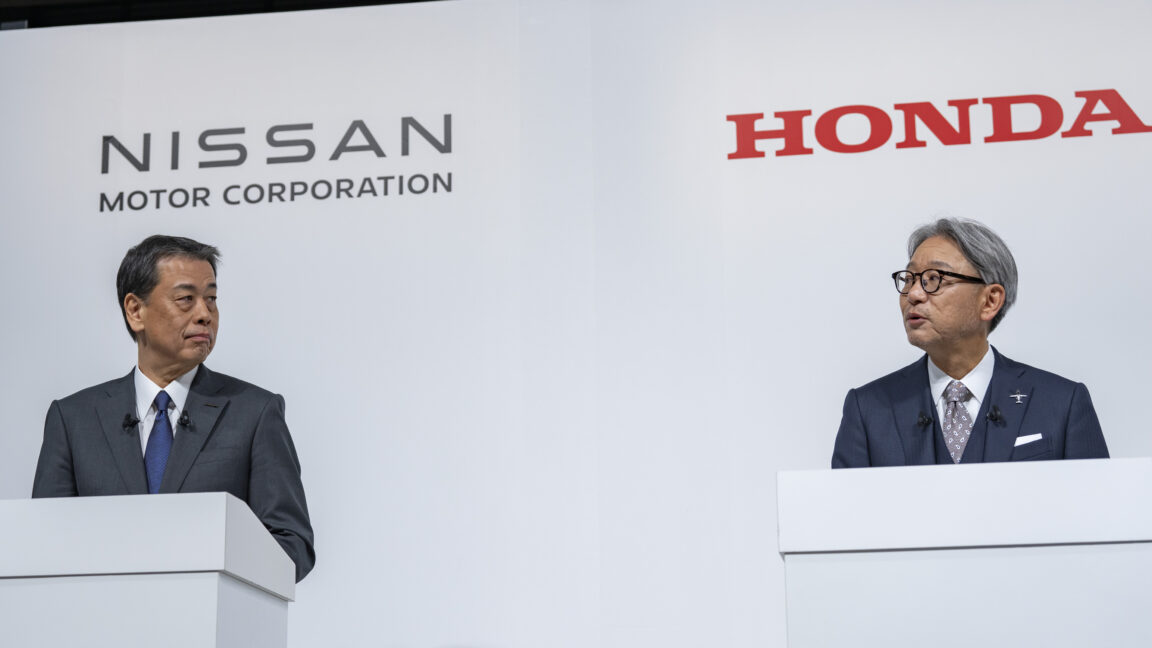Honda and Nissan to merge, Honda will take the lead
not a takeover Honda and Nissan to merge, Honda will take the lead if the deal goes through it would create the world's third-largest OEM in 2026. Jonathan M. Gitlin Dec 23, 2024 10:18 am | 45 Credit: Nissan/Honda Credit: Nissan/Honda Story textSizeSmallStandardLargeWidth *StandardWideLinksStandardOrange* Subscribers only Learn moreBeleaguered automaker Nissan is going to throw its lot in with Honda. The two Japanese OEMs want to merge by 2026, creating the world's third-largest car company in the process. In fact, earlier this year the two signed memorandums of understanding to create a strategic partnership focused on software and electrification. Now, the changing business environment calls for deeper integration, they say."Today marks a pivotal moment as we begin discussions on business integration that has the potential to shape our future. If realized, I believe that by uniting the strengths of both companies, we can deliver unparalleled value to customers worldwide who appreciate our respective brands. Together, we can create a unique way for them to enjoy cars that neither company could achieve alone," said Makoto Uchida, Nissan's president and CEO."Creation of new mobility value by bringing together the resources including knowledge, talents, and technologies that Honda and Nissan have been developing over the long years is essential to overcome challenging environmental shifts that the auto industry is facing" said Honda director Toshihiro Mibe. "Honda and Nissan are two companies with distinctive strengths. We are still at the stage of starting our review, and we have not decided on a business integration yet, but in order to find a direction for the possibility of business integration by the end of January 2025, we strive to be the one and only leading company that creates new mobility value through chemical reaction that can only be driven through synthesis of the two teams."Currently, Honda is an independent OEM, albeit one with strong links to General Motors. Meanwhile, Nissan currently forms one part of an alliance, together with France's Renault and the also-Japanese Mitsubishi. But the Renault-Nissan alliance has not been entirely smooth.In 2019, then-head of the alliance Carlos Ghosn was arrested by Japanese police on charges of financial misconduct. After three months under house arrest, Ghosn fled the country and Japan's criminal justice system, which rarely returns a not guilty verdict.What about Renault, Mitsubishi?Last year, Nissan agreed to invest $663 million into Renault's EV activities; at the same time Renault gave up the majority of its shares in Nissan, reducing the stake of each company owned by the other, down to 15 percent. That was meant to lead to "a broader range of EV products and powertrains," said Uchida at the time. But evidently it was decided that this arrangement was not sufficient to improve Nissan's electric vehicle portfolio.For its part, Mitsubishi says it will monitor the situation and decide whether or not to join at a later date. Meanwhile Renault said in a statement that "as the main shareholder of Nissan, Renault Group will consider all options based on the best interest of the Group and its stakeholders. Renault Group continues to execute its strategy and to roll-out projects that create value for the Group, including projects already launched within the Alliance."Assuming nothing throws a spanner in these particular works, the deal will be finalized by next June, with the new holding company for the two OEMs created by August 2026. Honda will take the lead of the new enterprise, in large part thanks to its larger market capitalization. But Mibe said that any real payoff from the merger wouldn't be realized until after 2030. The hope is that shared development costs and greater purchasing scale will help drive down costs, but both companies will continue existing partnerships such as that between Honda-GM as well.We can expect more shared vehicle platforms between Honda and Nissan, as well as deeper cooperation at the R&D stage. But there are also plans to optimize manufacturing, including facilities, as well as integrating supply chains and even sales financing to find cost savings and efficiencies.Jonathan M. GitlinAutomotive EditorJonathan M. GitlinAutomotive Editor Jonathan is the Automotive Editor at Ars Technica. He has a BSc and PhD in Pharmacology. In 2014 he decided to indulge his lifelong passion for the car by leaving the National Human Genome Research Institute and launching Ars Technica's automotive coverage. He lives in Washington, DC. 45 Comments


